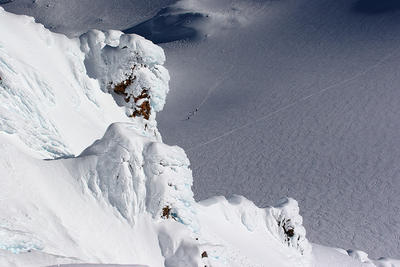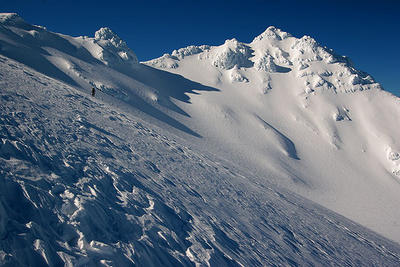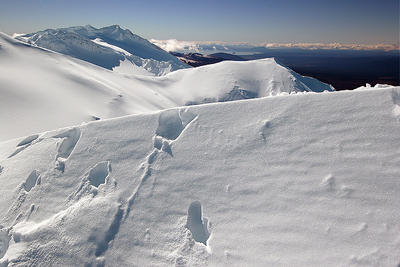 The early start was worth it, but we still had several hours' driving to reach the Turoa carpark by mid-morning. It was already half full, infested with SUVs and RVs and redolent with diesel fumes, overheated rubber, burnt oil and suncream. With a brilliant sun threatening to turn the climb slushy, we decided to take the chairlifts to the top of the skifield, so we walked up to a ticket counter and asked for lift passes.
The early start was worth it, but we still had several hours' driving to reach the Turoa carpark by mid-morning. It was already half full, infested with SUVs and RVs and redolent with diesel fumes, overheated rubber, burnt oil and suncream. With a brilliant sun threatening to turn the climb slushy, we decided to take the chairlifts to the top of the skifield, so we walked up to a ticket counter and asked for lift passes.
“That's $72 each”, she said, smiling brightly.
“Um”, I said, not smiling, weakly. Fortunately, John quickly explained that we weren't skiing; just wanting the ride to the top.
“It should be $16”, he said.
“Ok, that's $18 each”, she said, smiling brightly.
At the top of the second lift we made our way among the the melée of skiers and snowboarders whizzing and pranging like bottled fleas. Most of them ignored us, as they did everyone else—embracing the true spirit of capitalism, they regarded other human beings as mere obstacles to be negotiated. But as we trudged up the slope towards the skifield boundary, we did receive a few cheery “hi”s and other comments and queries. Two people slid past, clinging to the tow.
“Going to the top?” one asked.
“Yep, all going well”.
And it was. Apprehensive about the limited amount of time I'd spent in the hills since early in the year (i.e. none), I'd been stressing to John that I was expecting to feel sluggish and slow. But instead, I felt comfortable and relaxed; the snow a good consistency for walking; the weather brilliant. I looked around at the busy field and felt my cynicism evaporating—instead of seeing spoiled rich kids and up-themselves materialists, I saw hundreds of people enjoying the day; just a heap of people having a good time. Like me.
 We left the crowds behind, and crossed a short section of powder-covered ice into the Mangaehuehu neve. John, a little way ahead, stopped to put crampons on before crossing a large, shaded snowfield which would presumably be icy. Meanwhile, I swapped lenses and snapped photos and eventually decided against crampons when John called back that the snow was softer than expected and that I should be ok without them. He was right; in fact, the snow was soft enough for me to leave my crampons bundled up the whole day.
We left the crowds behind, and crossed a short section of powder-covered ice into the Mangaehuehu neve. John, a little way ahead, stopped to put crampons on before crossing a large, shaded snowfield which would presumably be icy. Meanwhile, I swapped lenses and snapped photos and eventually decided against crampons when John called back that the snow was softer than expected and that I should be ok without them. He was right; in fact, the snow was soft enough for me to leave my crampons bundled up the whole day.
I sidle around to a small snow bench just below the summit to shelter from a wind that's not strong but bitterly cold. We sit there, perched in the sky, eating lunch, looking south, looking down the steep ridge. The architecture's complex: massive cauliflowers and chandeliers of ice hanging over a glimpse of red and brown rock; snowbanks curving soft and smooth or rising to clean lines parting the light—one side blue shadow, the other a brilliant, glaring white. Far below, sunlight skids over the Mangaehuehu Glacier, picking out texture, stretching shadows. Three people, small as ants, cross the glacier towards the foot of the ridge; they're so tiny their movement seems imperceptible. Someone else skins over towards our line of footprints; on the summit of Tahurangi two people are silhouetted. Landscape as playground...
I think of Barry Lopez's words; how he points out that in the wake of the "...loss of personal and local knowledge, the knowledge from which a real geography is derived, the knowledge on which a country must ultimately stand ... has come something hard to define but...sinister and unsettling—the packaging and marketing of land as a form of entertainment."[1] Is this what has happened to Ruapehu? Undoubtedly. No one looking around from up here and seeing the snowboard trails, the tiny figures scattered over the mountain, the lines of footprints and the distant pillars of chairlifts and tows, would deny it.
 But I can guess that most of the people on the mountain that day—and that's a lot of people—returned feeling exhilarated and renewed. And that's a lot of happiness and renewal. I find it hard to condemn too roundly the activities that enable so many people to gain so much enjoyment. Sure, it's unattainable for many—if you can't afford $72 for a day pass, let alone the petrol to get there and back, you might resent the rich bastards who can afford it. But even rich bastards are human beings; even they are entitled to some happiness. Besides, you can console yourself by thinking that by the time they've paid for their day on the slopes, they'll have a tiny bit less money, and maybe, because they're happy, they'll be a little more compassionate and a tiny little bit less like bastards. (Well, there might be some truth in it).
But I can guess that most of the people on the mountain that day—and that's a lot of people—returned feeling exhilarated and renewed. And that's a lot of happiness and renewal. I find it hard to condemn too roundly the activities that enable so many people to gain so much enjoyment. Sure, it's unattainable for many—if you can't afford $72 for a day pass, let alone the petrol to get there and back, you might resent the rich bastards who can afford it. But even rich bastards are human beings; even they are entitled to some happiness. Besides, you can console yourself by thinking that by the time they've paid for their day on the slopes, they'll have a tiny bit less money, and maybe, because they're happy, they'll be a little more compassionate and a tiny little bit less like bastards. (Well, there might be some truth in it).
But back to the point. We took advantage of the chairlift; we used the road that wouldn't have been built if the skifield wasn't there. In some respects, if there's a finger to be pointed at those who prop up “the packaging and marketing of land as a form of entertainment”, then that finger is pointed at me, too. But, for me, there are limits—indefinite expansion of commercial activities all over the mountain is not acceptable. More importantly, I'd like to think that a fair proportion of the skiers, snowboarders and others would have left the mountain feeling the way I did: grateful for what the mountain (rather than the skifield operators) had gifted, and with a deep sense of respect for the mountain as something deeply significant and important; as something far greater than rock, ice and snow.
1. from Lopez, B. 1998: The American Geographies. Ch. 8 in: About this life. New York, Vintage Books (1999) ISBN 0-679-75447-4. 273 p. The quote is on pp. 135–6.
Photos and words copyright 2005 Pete McGregor
2 comments:
I really enjoyed this as a rare piece of realism. I often find the current trend amongst environmentalists in demonizing mankind over our roll in the environment, is as counterproductive as longing to get back into the Garden of Eden.
Thanks for the comment Paul. Sorry I'm late in responding — I missed it; found it by chance when I came back to check something. There's no doubt our effects on the environment — our environment — are horrendous and self-destructive, but railing achieves nothing worthwhile, and often indicates a lack of thought, or at least a lack of any attempt to understand truly what's happening and why it's happening.
Post a Comment